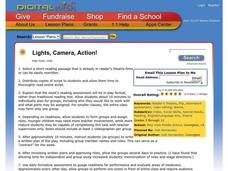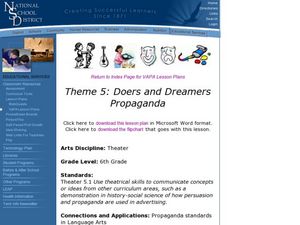Curated OER
Lights, Camera, Action!
Students participate in an alternative reading assessment using a video camera and script. In this alternative reading lesson, students work as a group to perform their reading story. students memorize their lines and film their play.
Curated OER
Movie Words- Word Search Worksheet
In this word search worksheet, learners locate 18 words that are related to movies. They find words that are located in a word bank at the bottom of the page. The works include action, animated, preview, and theatre.
Curated OER
S-O-I-L Soil
Fifth graders research soil, its nutrients, and plant growth. In this soil lesson, 5th graders create soil journals, trace flowers, and include nutrient information on each petal. Students read an excerpt from "McBroom Tells the Truth."...
Curated OER
Oral History Memoirs of American Experiences in Japan
Students identify the process of producing an oral history/documentary. Students analyze and synthesize information and memoirs as a valuable tool for exploring the past using primary resources. Students differentiate facts of historical...
Curated OER
Presentaciones De Danzas En La Ciudad De M¿¿xico
Students practice writing in Spanish. They visit web site that provides information about theatrical presentations, and answer questions in Spanish about schedule of performances for that week.
Curated OER
Port Talbot
In this ESL worksheet, students read an excerpt about Anthony Hopkins, the actor. They complete a crossword puzzle by responding to the 12 statements related to the excerpt. Then, students respond to seven questions also related to the...
Curated OER
Theme 5: Doers and Dreamers Propaganda
Seventh graders create and perform one act scenes that use the strategies of advertising. in this propaganda study lesson, 7th graders watch a commercial and are assigned a propaganda strategy. Students plan a scene that illustrates the...
Curated OER
Language Arts: Stick Puppet Show
Learners create short stories and make stick puppets to act it out. After editing their stories, they glue used CDs or DVDs to popsicle sticks and decorate them as the story characters. Finally, students present their puppet shows to...
Ford's Theatre
Socratic Seminar/Group Discussion: The Crisis of the Civil War
High schoolers work in four different groups to examine the many factors that led to the American Civil War. They research an assigned topic, prepare questions, and finally engage in a class discussion using the Socratic Seminar method.
Ford's Theatre
A Comparison of Lincoln’s Inaugural Addresses
Speech, speech! Analyzing speeches is no easy task. High schoolers learn the important process of annotation as they work together to analyze Lincoln's inaugural address. Then groups of four work to annotate a second speech at a more...
Ford's Theatre
Not Just Stone and Metal: Memory and Monuments Today
Should we remove historical Confederate monuments? Teach scholars both sides to the story using a resource that includes a class discussion, reading materials from two prominent figures on both sides of the argument, and an assessment...
US National Archives
WWII: Western Europe 1939-45 – D-Day
D-Day, also known as the Normandy Invasion, was a true turning point for the Allied forces and one of the most successful campaigns of World War II. After researching the factors that contributed to the campaign's success, high schoolers...
US National Archives
WWII: Western Europe 1939-45 – End of the War
You are Winston Churchill, and on May 9th, 1945, you receive millions of grateful cards and telegrams. How do you respond? High schoolers put themselves in the Prime Minister's chair with an activity that prompts them to respond to a...
US National Archives
WWII: Mediterranean and N. Africa 1939-45 – Where Will the Allies Invade?
An interactive asks learners to act as German intelligence agents and examine documents found on the body of an English soldier wash ashore on the cost of Spain. Using the documents, the agents are asked to predict where the Allies were...
US National Archives
Eastern Europe 1939-45 — Berlin
The inevitability of World War II has arrived: Berlin has fallen. Young historians watch contemporaneous footage of the event, analyze primary source documents, and write a news report that details the roles of the Soviet, British,...
US National Archives
Eastern Europe 1939-45 — Camps
Britain's decision not to bomb German death camps in World War II has provided many questions for historians, but with a primary source analysis lesson, high school students may be a step closer to finding out the truth. Learners read...
US National Archives
Eastern Europe 1939-45 — Stalingrad
Acts of civilian courage in Great Britain—and in one case, the island of Malta—often receive the George Cross, instituted by King George VI at the beginning of World War II. After the valiant defense of Stalingrad by its inhabitants,...
US National Archives
Eastern Europe 1939-45 — Ukraine
Was Joseph Stalin desperate or exaggerating the USSR's need for assistance on the Eastern Front in 1942? History students examine two differing opinions on Stalin's position and the reality of the Eastern Front just three years before...
US National Archives
WWII: Asia 1939-45 – Burma
Because World War II encompassed most of the globe in one way or another, many pivotal battles and events are not as visible in the history books, leaving veterans of these conflicts feeling overlooked by more famous skirmishes. High...
US National Archives
WWII: Asia 1939-45 – Singapore
The fall of Singapore in World War II was shocking news for the Allied forces—but why? High schoolers explore primary source documents and videos to determine why February 15, 1942 was a wake-up call to the British Empire and its allies...
US National Archives
WWII: The Pacific 1939-45 – Iwo Jima
Of the images that have permeated history to define American courage, perseverance, and patriotism, the 1945 photograph of United States Marines raising the flag at Iwo Jima is one of the most well known. After researching the pivotal...
US National Archives
WWII: The Atlantic 1939-45 – Battle of the Atlantic
The most dangerous line of attack during World War II wasn't the German planes soaring above Britain, but the U-Boats cutting off their supplies of food and equipment. Learners research the Battle of the Atlantic, the German campaign to...
US National Archives
WWII: The Pacific 1939-45 – Pearl Harbor
Though December 7th, 1941 was a day "which would live in infamy," World War II had provided many infamous days, events, battles, and atrocities in the years before. So why were American forces so surprised when Japan attacked Pearl...
US National Archives
WWII: The Pacific 1939-45 – Japan and the Atom Bomb
Though the scientists who developed the atom bomb did not believe it should be used to end World War II, American President Harry S. Truman and British Prime Minister Winston Churchill were of like mind in their decision to drop the bomb...
Other popular searches
- Musical Theatre
- Globe Theatre
- Greek Theatre
- Readers Theatre
- Technical Theatre
- Christmas Readers Theatre
- Theatre Character Analysis
- Theatre Arts
- Reader's Theatre
- Acting in the Theatre
- Theatre of the Absurd
- Epic Theatre

























